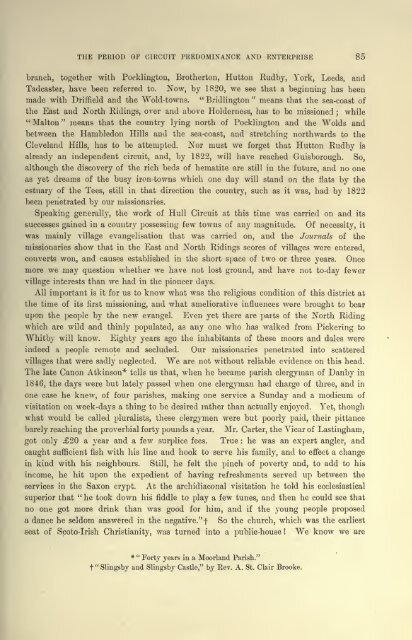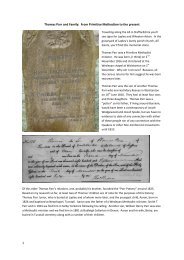Vol 2, pages 1-100 - My Primitive Methodist Ancestors
Vol 2, pages 1-100 - My Primitive Methodist Ancestors
Vol 2, pages 1-100 - My Primitive Methodist Ancestors
You also want an ePaper? Increase the reach of your titles
YUMPU automatically turns print PDFs into web optimized ePapers that Google loves.
THE PERIOD OF CIRCUIT PREDOMINANCE A.ND ENTERPRISE 85<br />
branch, together with Pocklington, Brotherton, Hutton Rudby, York, Leeds, and<br />
Tadcaster, have been referred to. Now, by 1820, we see that a beginning has been<br />
"<br />
made with Driffield and the Wold-towns.<br />
" Bridlington means that the sea-coast of<br />
the East and North Ridings, over and above Holderness, has to be missioned ;<br />
while<br />
"Malton" means that the country lying north of Pocklington and the Wolds and<br />
between the Hambledon Hills and the sea-coast, and stretching northwards to the<br />
Cleveland Hills, has to be attempted. Nor must we forget that Hutton Rudby is<br />
already an independent circuit, and, by 1822, will have reached Guisborough. So,<br />
although the discovery of the rich beds of hematite are still in the future, and no one<br />
as yet dreams of the busy iron-towns which one day will stand on the flats by the<br />
estuary of the Tees, still in that direction the country, such as it was, had by 1822<br />
been penetrated by our missionaries.<br />
Speaking generally, the work of Hull Circuit at this time was carried on and its<br />
successes gained in a country possessing few towns of any magnitude. Of necessity, it<br />
was mainly village evangelisation that was carried on, and the Journals of the<br />
missionaries show that in the East and North Ridings scores of villages were entered,<br />
converts won, and causes established in the short space of two or three years. Once<br />
more we may question whether we have not lost ground, and have not to-day fewer<br />
village interests than we had in the pioneer days.<br />
All important<br />
is it for us to know what was the religious condition of<br />
this district at<br />
the time of its first missioning, and what ameliorative influences were brought to bear<br />
upon the people by the new evangel. Even yet there are parts of the North Riding<br />
which are wild and thinly populated, as any one who has walked from Pickering to<br />
Whitbv will know. Eighty years ago the inhabitants of these moors and dales were<br />
indeed a people remote and secluded. Our missionaries penetrated into scattered<br />
villages that were sadly neglected. We are not without reliable evidence on this head.<br />
The late Canon Atkinson* tells us that, when he became parish clergyman of Danby in<br />
1846, the days were but lately passed when one clergyman had charge of three, and in<br />
one case he knew, of four parishes, making one service a Sunday and a modicum of<br />
visitation on week-days a thing to be desired rather than actually enjoyed.<br />
Yet, though<br />
what would be called pluralists, these clergymen were but poorly paid, their pittance<br />
barely reaching the proverbial forty pounds a year. Mr. Carter, the Vicar of Lastingham,<br />
got only 20 a year and a few surplice fees. True : he was an expert angler, and<br />
caught sufficient fish with his line and hook to serve his family, and to effect a change<br />
in kind with his neighbours. Still, he felt the pinch of poverty and, to add to his<br />
income, he hit upon the expedient of having refreshments served up between the<br />
services in the Saxon crypt. At the archidiaconal visitation he told his ecclesiastical<br />
superior that " he took down his fiddle to play a few tunes, and then he could see that<br />
no one got more drink than was good for him, and if the young people proposed<br />
a dance he seldom answered in the negative." f So the church, which was the earliest<br />
seat of Scoto-Irish Christianity, was turned into a public-house<br />
! We know we are<br />
* " Forty years in a Moorland Parish."<br />
t " Slingsby and Slingsby Castle," by Eev. A. St. Clair Brooke.



